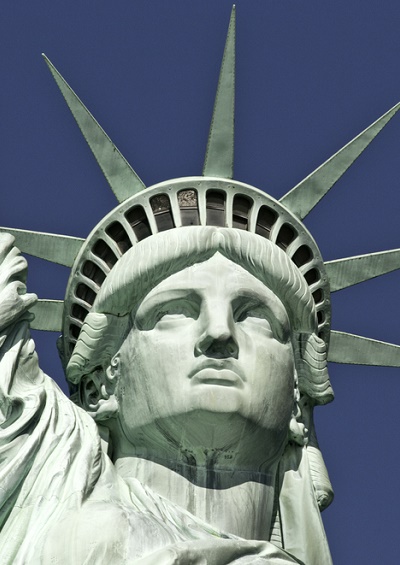WANTED: A Foreign Policy Slogan
The search for a “post” to describe U.S foreign policy continues.
June 27, 2014

The United States is in desperate need of a slogan.
Think about it. By 1945, Americans had a name for that new era: They simply called it “post-war,” meaning post-World War II.
By the time of the fall of the Berlin Wall and the collapse of the Soviet Union, we were living — logically enough — in the “post-Cold War” world. September 11, 2001, tragically led Americans into the “post-9/11” age.
And then, in 2011 there was the Arab Spring which later failed to bloom in Egypt and Libya. As things stand in the region, Tunisia is succeeding but that, alone, doesn’t warrant a “post-Arab Spring” slogan.
Foreign policy by any other name
So now, in 2014, we are without a foreign policy label. We thought we were post-Iraq and Afghanistan, but ISIS managed to change that through an insurgency that is dragging us back to Baghdad.
And even the U.S. penchant for foreign policy sub-titles is proving less than durable. Just think of the futile talk about a “re-set,” “re-balance” or “pivot.”
That entire set of labels urgently needs revising thanks to Vladimir Putin. In no time, he has forced Americans to concentrate, again, on Europe.
So what does a nation that currently has to operate without a useful foreign policy bumper sticker like “containment” do?
In short, the United States needs a national debate to decide what to call this phase of the international age. This is an American task not because Americans still dominate the global agenda, but because of their innate ability to come up with good labels.
Name-crafting aside, this debate is also necessary to frame what the broader U.S. approach to the world should be. Virtually all Americans know we can’t afford something big and expansive like “nation-building,” and most of us also realize we can’t afford something small and insular like “isolationism.”
Foreign policy in the age of Twitter
Why is it important to have a foreign policy brand? Well, first of all, most books have titles. A title provides a way to decide if you want to read further.
Second, finding a slogan will appease foreign policy writers and editors who need a phrase to serve as a short-cut to long, complex policies—something that fits an age of sound-bites and 140-character tweets.
Finally, slogans are great for political campaigns and presidential elections — and we have plenty of those coming up.
And even though democracy is on the defense in quite a few of the world’s regions, as evidenced quite painfully by ever more restrictive media policies practiced not just in totalitarian countries, this still is the age of citizens, empowerment and online sharing.
Therefore, the best way to proceed may be to employ the collective intelligence of the public. Citizens can vote on which slogan they like best. To kick start that debate, here are some preliminary options:
Smart Engagement:
A foreign policy designed to use technology in lieu of troops, i.e., drones, satellites, hacking, cyber warfare and other instruments of power that are unmanned (or un-womaned).
Eco-Diplomacy:
A foreign policy, post-2008’s fiscal crisis, rooted in money. Under this foreign policy, we use things like sanctions as a stick and investments as a carrot. Our values and interests would be tied to interest rates and global markets.
Green Diplomacy:
Despite the fact that some might confuse it with the “green party,” this environmentally friendly foreign policy would be all about climate change.
Our government would empower meteorologists and forecasters with a goal of lowering population growth or raising agricultural production around the world.
Call it the post-carbon-footprint foreign policy. Once we get the resource-allocation problems and the weather under control, we can consider other options.
Disaster Diplomacy:
Under this foreign policy approach, the United States mainly responds to humanitarian disasters and crises like mud slides, tsunamis, droughts, nuclear reactor meltdowns and refugee flows. We essentially become U.S. Agency for International Development on steroids — an international 911 police force.
Public Diplomacy:
We could just blog about our national interests and values. That would reflect an event-driven foreign policy where we talk big — and actually carry a twig.
Speechwriters would become the most powerful influential voices in the global arena and social media would be the engine of real change. Essentially, we would all just put our iPhones in the air and sway a lot. It’s pretty cheap and easy.
No Labels:
We could also throw in the towel and steal a page from Naomi Klein, the author who first came up with the No Logo moniker. A foreign policy without a title is a recognition that we live in a world that is simply too multifaceted and complex to fit under one label and still make it appear useful.
Although sad — an anonymous foreign policy might be a true realization that we all live in our own reality, depending on the world region in which we live or political ideology or other belief system that we are shaped by.
But, then again, coming up with bumper stickers keeps PR firms and branding agencies in business — along with writers with too much time on their hands.
Hence, let’s meet the slogan demand. Submit your ideas in the comments below. We are just one click away from solving the world’s problems.
Takeaways
The United States is in desperate need of a new slogan for its global endeavors.
We are just one click away from solving the world’s problems, a slogan at a time.
The US needs a new slogan for its foreign policy and citizens should vote on which slogan should lead the way.
@Tsonenshine kick starts the debate over the next great US foreign policy slogan.
In a multifaceted, ever more complex world, can leaders and media still slap a slogan on foreign policy?
Read previous

This Thing Europeans Call Football
June 27, 2014
